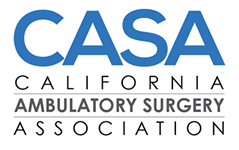Complete Story
09/24/2024
Celebrating Hispanic Heritage Month
Profile of CASA Member Sylvia Uriarte, Business Office Manager, Central Coast Surgery Center
The dates for celebrating National Hispanic Heritage Month (September 15th through October 15th) were chosen to coincide with the anniversaries of independence for several Latin American countries, including Costa Rica, El Salvador, Guatemala, Honduras, Nicaragua, Mexico, Chile, and Brazil. As we continue to celebrate Hispanic Heritage this month, we invite you to learn more about CASA Member Sylvia Uriarte.
Member Spotlight
Sylvia Uriarte, Business Office Manager, Central Coast Surgery Center
What does Hispanic Heritage Month mean to you?
It is a time to reflect on where I come from and give thanks to the people that came before me. I am who I am because of their courage to come to a new country for the American dream.
What does it mean to you to represent a minority community in the U.S.? What does it mean to you to represent a minority community while working in the healthcare industry?
Watsonville, CA, is home to a population of 52.5k residents, with a majority of its residents being of Hispanic descent.
Our Surgery Center sees over 2,200 surgical patients a year, of which, 80% are Hispanic. Out of the 80%, 50% are only Spanish speakers. I am very proud to always look out for my Hispanic patients and help them understand their healthcare. All of our patient paperwork comes in both English and Spanish. 80% of the staff is bilingual, which helps us communicate better with our patients.
What do you wish people understood more about Hispanic cultures?
Hispanics are hardworking people. We are not here to take jobs away from anyone. We are proud to have income and proud to be part American and to have the American dream.
Will you be doing anything to celebrate Hispanic Heritage Month? How do you suggest other non-Hispanic people could embrace or honor this month?
I will be more conscious about speaking with my immediate family and my girls. I will remind them of where we came from and tell them the stories of my parents’ struggles and obstacles, and what they faced in a new country.
Have you seen any noteworthy programs or projects in the healthcare industry that are aimed at encouraging equity and diversity in the workplace or in patient care?
I do appreciate how most paperwork is now offered in Spanish for our patients to easily understand. There are more Hispanic people working in healthcare who can translate and help keep the patients more informed on their healthcare.
What else would you like to share?
A personal back story: I was born and raised in Chicago by two immigrant parents. My Dad was illiterate and only knew his numbers, and my mom only went to school for three years. They were very hard-working and responsible and took pride in their achievements. They received amnesty in the 80’s. My dad worked in construction, with a good-paying job with union benefits. My mom was a stay-at-home mom.
Growing up, I remember going once a year to a free clinic held in the local park building for our annual physical and immunizations. One day, it was brought up in conversation and my uncle asked my mom why she was taking us to the free clinic since we had health insurance. The union my father worked for had one of the best insurance plans. My mom responded that she didn’t know what the purpose was of insurance or how it worked. They received paperwork in the mail, but she would just throw it out since she did not know how to read in English. My siblings and I became the translators on all medical paperwork.
Living in Watsonville with 80% of the population being Hispanic, I can give back to my people and help them out. I train all my staff to take an extra five minutes and explain to patients the process of receiving their healthcare benefits. Most Hispanics come from a culture where they do not question authority, but in healthcare, asking questions or asking for second opinions are important so that critical information is not left out. Over the last few years with the medication reconciliation list form, the nursing staff will take time and explain what each medication is for and why it is so important to take or not take before surgery.


